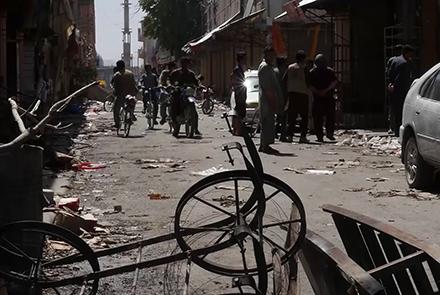Officials from the Independent Human Rights Commission of Afghanistan (AIHRC) on Wednesday said that human rights violations were committed in Ghazni and in many cases war crimes occurred, during the four-day siege on the city.
AIHRC also said substantial damage was caused to government property while large scale damage was caused to private property, with many homes and businesses having been looted.
As more reports emerged from the city, which came under heavy attack by the Taliban starting in the early hours of Friday morning, sources told TOLOnews’ journalist in Ghazni that in the first few hours of the attack, only a small number of security forces resisted the onslaught – which enabled the Taliban to take over key areas of the city’s PD2.
One shopkeeper, Omid, said: “They did not address the condition that the people were facing. The entire market has been torched.”
However, five days after the start of the attack President Ashraf Ghani reacted to the crisis and said on Wednesday that security forces had made progress in the province.
“The main part of Ghazni city has been cleared; our security and defense forces are busy there; a clear plan has been outlined for them,” said Ghani on Wednesday.
According to sources, on the night of the attack, the power supply to the city was disconnected which was followed by the disconnection of all communication services.
A provincial council member, Hamidullah Sarwari, has however put the blame squarely on the security ministries – stating that provincial officials had repeatedly called for more troops in the city.
“The ministry of interior and the ministry of defense are responsible in this respect, we always suggested that the current structure of security forces does not meet the requirements of Ghazni in view of Ghazni’s territory and security climate,” he said.
In reference to the human rights violations issue the AIHRC said bodies lay untouched on the ground for days.
“Massive devastation and civilian casualties occurred there, civilian properties were looted, attacks were carried out on civilians and on public areas and these cases are clear indicators of human rights violations - and even in many cases war crimes,” said Musa Mahmoudi, an AIHRC member.
Meanwhile, the head of the UN Assistance Mission in Afghanistan (UNAMA) Tadamichi Yamamoto said in a statement that the attack on Ghazni caused terrible suffering to civilians.
“The Taliban’s attack against Ghazni city, and the subsequent fighting in densely populated urban spaces, has again caused terrible suffering to civilians caught in the conflict. Equally unacceptable, the fight for the city of Ghazni has exacerbated deep-rooted wounds dividing Afghan communities at a time when cohesion is more crucial than ever before,” read the statement.
According to the statement, reports indicate that the casualty toll in Ghazni is immense – among government forces, Taliban fighters and civilians. Unconfirmed estimates range from 110 to 150 civilian casualties, the statement read. Reliable information indicates that the Ghazni Public Hospital is overwhelmed by a continuous influx of injured government forces, Taliban fighters and civilians.
Reports also indicate that the situation in Ghazni for non-combatants remains particularly grim, as the fighting has led to electricity outages along with water and food shortages. Communication networks and media outlets have been shuttered, and roads remain blocked, preventing freedom of movement for families seeking safety, UNAMA’s statement read.
Yamamoto meanwhile said that humanitarian organizations are ready and willing to supply desperately needed assistance but that they must be given explicit, public and absolute guarantees by all parties to the conflict that they will be allowed to operate safely, without hindrance or any attempts to interfere with distribution carried out under humanitarian principles.
“The extreme human suffering caused by the fighting in Ghazni highlights the urgent need for the war in Afghanistan to end. The United Nations continues to maintain that there can be no military solution to the conflict in Afghanistan,” he said.


